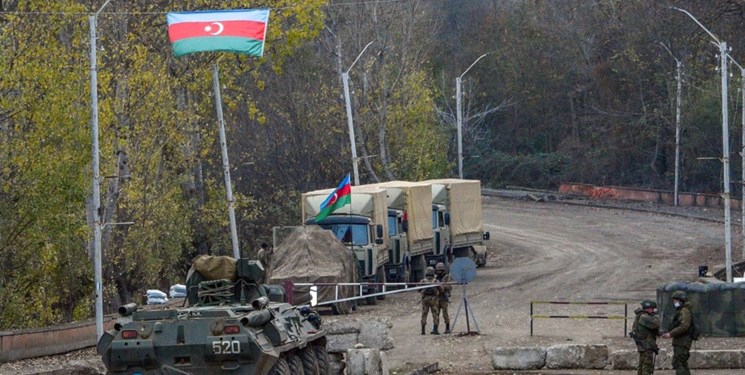The Corridor has been closed by the Baku government since December 12, 2022, with the aim of putting pressure on the Armenian government.
While besieging 120 thousand people and creating many problems for the Armenian residents of the Karabakh region, such a measure has practically “blocked” the route for sending humanitarian aid and has put them in a “very difficult” condition.
The Azerbaijan government claims that there is no prohibition or obstacle for civilians to pass through the Lachin Corridor. Still, Armenia says that the Baku authorities, by organizing their agents under the name of civil forces and environmental activists, prevent the transfer of fuel, food, and medical items to the “Khankandi” city. In this way, they have paved the ground for a “human disaster” in that region.
In the ceasefire agreement signed after the 44-day war between Russia, Azerbaijan, and Armenia on November 9, 2020, the status of Khankandi, the center of Karabakh, remained “unclear,” and no decision was made. However, in paragraph 6 of the agreement above, it is stated that the parties are committed to creating a passage between Khankandi and Armenian territory through the city of Lachin, which provides “access” from Karabakh to Armenia and must be under the control of the Russian peacekeeping forces.
Azerbaijan has also been “committed” to guarantee the safety of citizens, vehicles, and goods movement along the Corridor in both directions.
Given the explicit agreement that exists in this field, the blocking of the Lachin Corridor by Azerbaijan in any form and under any cover is a “clear violation” of the November 9 agreement and “contrary” to the rules and regulations of international law and the rulings of the International Court of Justice. More than before, this issue has added to the existing tensions in the South Caucasus and developments around Karabakh.
Although the government of Azerbaijan acts as a claimant player in this regard, in practice, the interests of other players, especially “Britain” and “Turkey,” are more important.
The government of Azerbaijan may pursue various goals and excuses. Still, currently it has only one goal: Azerbaijan seeks to “equalize” the Lachin Corridor with “The Zangezor Corridor,” in which Turkey is the most important stakeholder. The pressure on Armenia to agree to the Zanegzor Corridor is at the top of the Baku government’s motivations to close the Lachin Corridor, behind which others pursue more extensive, more “strategic” goals.
For Turkey, the Zangezor Corridor is the “connection point” of the eastern part with the western part of the “Greater Turkestan” or the Turkish world, which Ankara seeks to advance, especially in recent years, following the “failure of the policy of Ottomanism” at the macro level. This is in addition to the geo-economic and geo-strategic benefits of the Zangezor Corridor for Turkey.
Britain is another vital player who plays a purposeful, covert, and indirect role and is beneficial in developing the Lachine Corridor. With its mountainous characteristics, according to existing estimates, Karabakh is one of the “important poles” of gold, copper, molybdenum, and other precious metals in the region, worth 20-50 billion dollars.
The British Anglo-Asian Mining Company has taken over the “monopoly” of exploiting gold mines in Karabakh since 1997, when Karabakh was under the occupation of Armenia, with all cleverness and in a long-term plan, according to an agreement with the government of Azerbaijan by paying 3 billion dollars!
In the past two years, when Azerbaijan liberated a large part of Karabakh and, as a result, dominated its gold mines, Britain, by abusing the atmosphere of tension in the South Caucasus, according to the previous treaty and through special mechanisms, sought to “exploit” the mining resources in the mountainous Karabakh.
This shows that “facilitating British access to the gold mines of Karabakh” is one of the “strategic goals” of blocking the Lachin Corridor. It is a great help for that country, especially in the current situation when Western countries, including Britain, are facing economic problems and a lack of raw and imported resources.
There is a very important issue here; Britain’s entry into the case of Lachin Corridor and other regional corridors and role-playing definitely has “destructive and security” dimensions and consequences. Aside from the intra-regional tensions that exist over it, British presence and influence in the Karabakh region has only “short-term benefits” for the government of Azerbaijan and has negative consequences for the security and national interests of Azerbaijan in the long run.
It is worth mentioning that the involvement of extra-regional players such as the United States, Britain, and some European countries are among the effective factors in turning the Karabakh conflict into a “frozen battle” for the resolve of which no peace agreement or political framework is foreseen.
Britain is a well-known country that continues to use every opportunity to advance its interests with a “colonial approach.” By dominating the resources of the South Caucasus and influencing the actions and power equations in the region, Britain seeks to create a “strong foothold” for itself in competition with the US, Russia, and other players.
Intensification of the existing tensions in a situation where the region needs peace and security is the least consequence of Britain’s entry into the South Caucasus, making intra-regional conflicts possible at any moment. Meanwhile, the British effort to transfer the mineral resources and gold of Karabakh to the European markets has aggravated the “human rights disaster” in the Armenian areas of Karabakh, which is the responsibility of the governments that welcomed Britain into the region or provided the conditions of its presence and destructive influence.










0 Comments